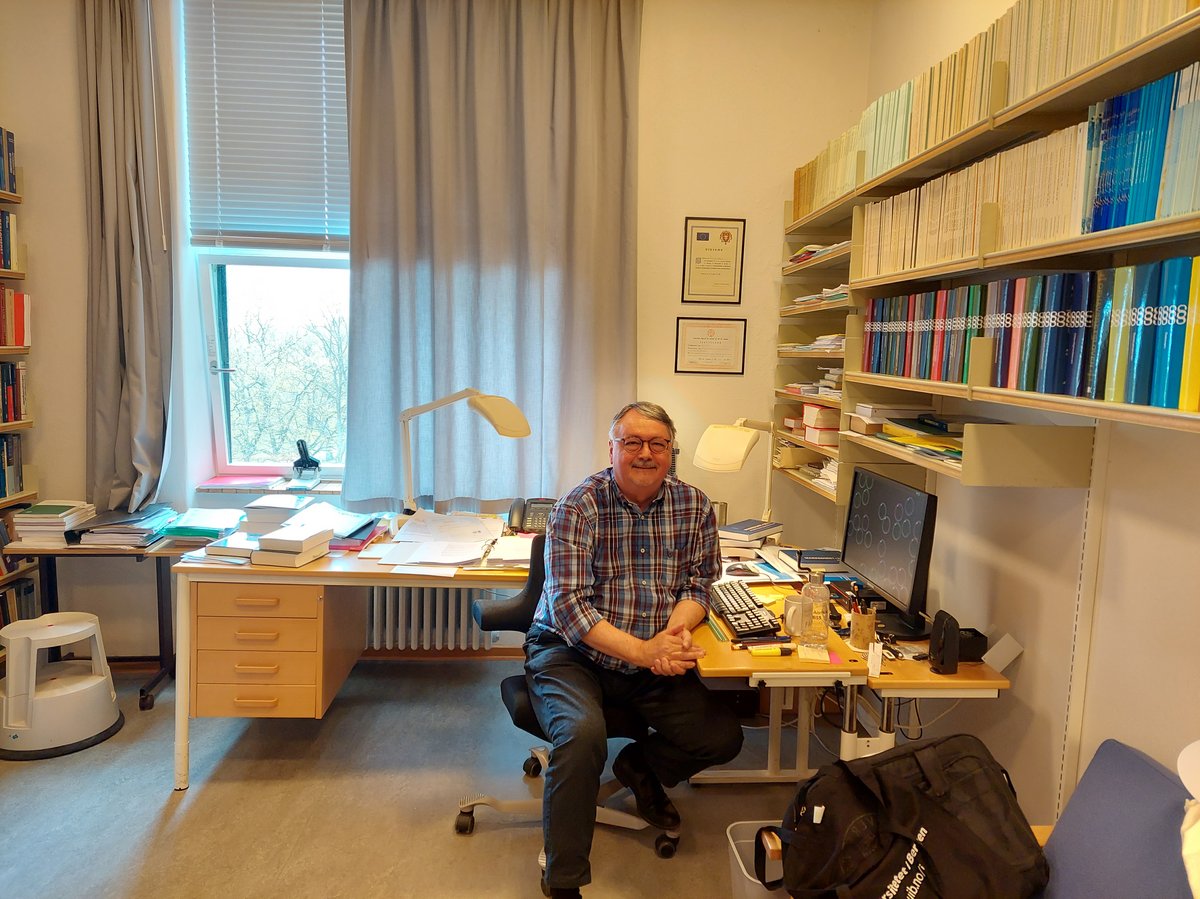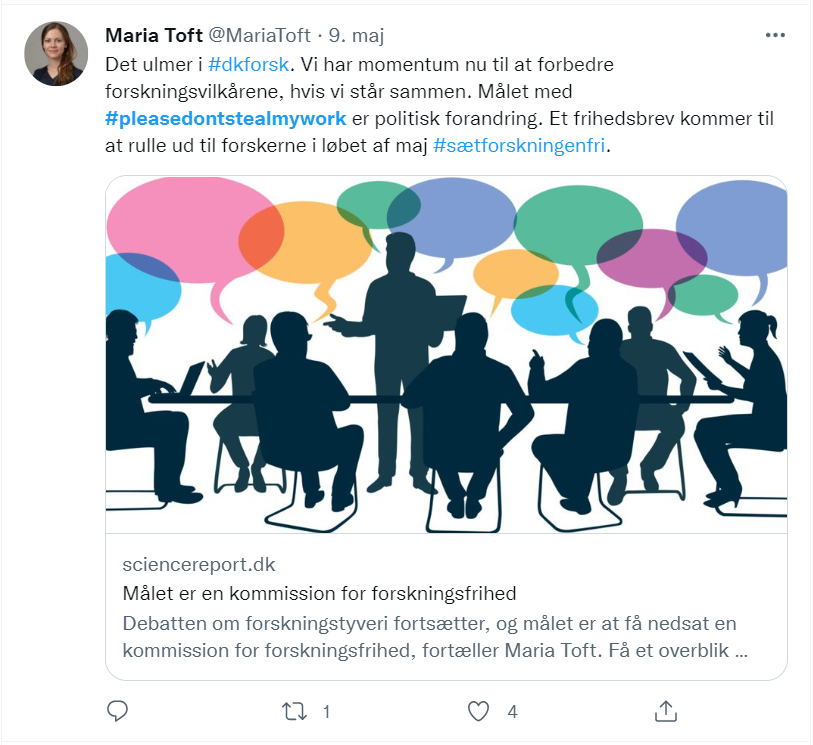#Pleasedontstealmywork – few cases come to light, but research theft may still be taking place at AU
Since the #pleasedontstealmywork campaign was launched in February this year, neither AU union representatives nor chairs of the AU Research Practice Committee or the PhD Association have been made aware of any specific cases of research theft at the university. But many are keen to point out that research theft may still be taking place. Until now, only a few cases of plagiarism and data misuse have been brought before the Research Practice Committee.

In 120 anonymous testimonies, early career researchers employed at Danish universities describe how supervisors have unfairly demanded co-authorship on their publications or have stolen their ideas or data.
Such practices are described as research theft, and the campaign #pleasedontstealmywork, which has given rise to several testimonies from early career researchers and PhD students across the country, was started in February by PhD student Maria Toft from the University of Copenhagen. Maria Toft has also experienced what she describes as research theft.
In one of the 120 testimonies, which was published on the website Science Report in April, it states:
“The lead researcher in our department is put as co-author on every single academic article we publish, without meeting the criteria for co-authorship outlined in the Vancouver recommendations. Without contributing anything of significance. Just by virtue of being head of department”.
Could this account originate from Aarhus University? Perhaps. But if you ask Palle Bo Madsen, who is professor of law and chair of the Research Practice Committee at AU, the committee has only come across a few similar cases, and none of these has involved senior researchers wrongly claiming co-authorship on early career researchers’ articles.
“We have not dealt with any cases that involve forced co-authorship. They have not been brought to our attention at least. We obviously don’t know whether such things are going on under the radar, but we fear they might be,” says Palle Bo Madsen.
#Pleasedontstealmywork campaign
The #pleasedontstealmywork campaign was started by PhD student at the University of Copenhagen Maria Toft in collaboration with PAND, the PhD Association Network of Denmark.
It was partly inspired by the #MeToo campaign, and its objective is to start a discussion about research theft and to determine how widespread it is. In May this year, Maria Toft also wrote on Twitter that she hoped the campaign would lead to political change and the establishment of a commission on the freedom of research.
On this page, academics working at Danish universities can provide their own anonymous reports.
After more than 100 researchers – mainly early career researchers – submitted reports in May, 120 testimonies from 107 researchers were published anonymously on the website Science Report.
Most reports concern senior researchers attaching their names to projects they haven’t contributed to. Others involve senior researchers stealing ideas, not crediting early career researchers, or using data collected by early career researchers without their permission.
Plagiarism cases and disputes about the use of data
Over the years, however, the committee has dealt with cases of plagiarism, which have also involved the relationship between a supervisor and a PhD student. But this is not a trend, he explains. There was one single case in which a PhD student believed their supervisor had used their data in several articles without approval.
Palle Bo Madsen believes that the different faculties and subjects at AU all have their own academic traditions. In the humanities and social sciences (Aarhus BSS and Arts, ed.), which he works in, there are rarely several authors on the same article, unlike in some of the science subjects at Health, Nat and Tech.
“There is nothing necessarily immoral about a supervisor and a PhD student publishing together. In fact, in some subjects, it’s almost the norm. But then you assume that they have discussed it and that they have both contributed to the article,” he says.
“In the sciences there are often several authors on the same article, and this is seemingly accepted in these subjects. We could question whether this practice is completely in line with the Vancouver Recommendations. Whether everyone listed has contributed enough to justify their authorship. But this takes place on a large scale in certain subjects and, as far as I am aware, is accepted in these disciplines. Well, nobody has brought any such cases before us at least,” he says.
Chair of the Research Practice Committee: It’s difficult to set exact rules
When working in a group or with a supervisor, it’s difficult to set exact rules for who should be recognised as the author of an article or who should be credited as the source of a good idea for a project, explains Palle Bo Madsen. This is why the chair of the Research Practice Committee cannot categorically say what is right and wrong without considering specific cases.
“There are obviously grey areas. If a PhD student has conducted an independent project, their supervisor or other researchers clearly cannot just come along and demand co-authorship. This would conflict with the responsible conduct of research. But determining how much a researcher needs to contribute in order to justify co-authorship will always depend on the specific case.”
“In general, you must have contributed independently to the academic project on some level, other than just having made the coffee or performed purely practical tasks. This doesn’t necessarily mean that you were involved in all phases of the project or involved from the start. But if you have contributed academically in some way, for example you have read or commented on something that has affected the result, you will have met the criteria for co-authorship.”
FACTS:
What is the Research Practice Committee?
- Anyone who suspects a breach of responsible conduct of research or threats to freedom of research at Aarhus University can bring the case before the Research Practice Committee.
- The Research Practice Committee can consider cases of questionable research practices or threats to freedom of research. If the committee finds that a case involves questions of research misconduct, the case will be submitted to the Danish Committee on Research Misconduct for consideration at national level.
- The Research Practice Committee concludes its cases by submitting a statement to the rector. If relevant, this statement can include recommendations for disciplinary measures or other responses.
- The Committee consists of a chair and two researchers from each of the five faculties.
What is a research practice adviser?
- The task of a research practice adviser is to provide other researchers, managers at the university or members of technical/administrative staff with confidential and objective advice and guidance on research integrity, freedom of research and the responsible conduct of research.
- Unlike the Research Practice Committee, advisers do not deal with specific cases, which is why they are good people to contact for initial advice.
- You can find contact information for research practice advisers at AU on this page.
Source: Research Practice Committee and research practice advisers.
Reports to the PhD Association can be counted on one hand
Kristoffer Holst Ibsen is chair of the AUPA – the association for PhD students at AU – and he recognises the picture being painted by the reports in the #pleasedontstealmywork campaign.
“There have definitely been times when we’ve discussed this issue of co-authorship with various PhD students and thought: “Hang on, this sounds completely immoral,” he says.
Many supervisors wish to be included as co-authors on a publication without having contributed, and this primarily affects early career researchers in the hard sciences. Kristoffer Holst Ibsen doesn't know how these cases progress, but he suspects that very few people go on to take formal action.
He recommends that early career researchers talk to AU’s research practice advisers, because they are independent and all discussions with them are confidential. It is only when the case is brought to the Research Practice Committee that the other party is included. And, as chair of the Research Practice Committee Palle Bo Madsen puts it, people “don’t get to be on better terms” by bringing a case before the committee.
AUPA is particularly concerned about the imbalance of power that exists between a supervisor and a PhD student. Early career researchers are vulnerable, because they are not employed on a permanent basis, and their future in academia partly depends on the decisions of senior researchers, since external funding, for example, can rarely be applied for by a single PhD student.
“Imagine a supervisor who has received external funding to employ one postdoc and who has two PhD students, both of whom would like the position and are equally good academically. Does the supervisor employ the PhD student who has raised problematic issues and is unhappy with their supervisor being co-author? Or does the supervisor employ the PhD student who keeps quiet and continues to work without complaining? It is easy to question the benefits of voicing your concerns with your supervisor when it is often your supervisor who decides your future in academia. I think it’s here that many problems associated with stress and uncertainly arise,” says Kristoffer Holst Ibsen.
It ultimately comes down to the fact that some subject areas have an unhealthy academic culture, he says.
“It is clearly a cultural problem that would not exist if everyone adhered to the rules, were kind and decent, and approached their work with integrity,” says Kristoffer Holst Ibsen.
DJØF receives reports following the campaign
In recent months, Caroline Adolphsen, who is associate professor of law at AU and chair of DJØF’s research and education committee, has begun to receive reports from DJØF members.
“There is pressure on permanent staff to work for nothing, pressure to share research data, and pressure to be listed as a co-author. In other words, these reports paint a similar picture to the #pleasedontstealmywork testimonies,” says Caroline Adolphsen, who is also union representative for members of academic staff at Aarhus BSS.
Caroline Adolphsen stresses that all these reports are confidential and are not necessarily from AU.
Have you experienced research theft? Write to us at Omnibus
If you or a colleague have faced pressure to add co-authors, have not been credited for your work, or have had projects, data or ideas stolen, we would like to hear from you. Send us your account at omnibus@au.dk.
Adolphsen: The problem also exists at AU
If we examine the reasons for such reports, which, according to the associate professor, are connected to the fact that many early career researchers are employed on temporary contracts (such as postdoc contracts), there is no reason to believe that this problem does not exist at AU.
“If we look at the WPAs, there are several young employees whose future prospects are uncertain, and many of these are employed on externally funded projects. So, at AU, we can easily recognise the mechanisms we have seen in other cases. The fact that nobody has raised the issue does not mean that there isn’t a problem,” she says.
Like Kristoffer Holst Ibsen, she believes we have to consider the structure of power at AU. As long as early career researchers are dependent on senior researchers, there is a risk that senior researchers will misuse their power.
“We cannot eliminate this risk, which is why it’s important for researchers – including experienced researchers – to be informed about where the line is and what is right and wrong. And then to clamp down on behaviour that does not live up to this. This involves asking whether people who behave in this way should even be employed at AU,” says Caroline Adolphsen.
FACTS:
What are the Vancouver Recommendations?
The Vancouver Recommendations – also known as the ICMJE Recommendations – constitute eight pages of guidelines that define authorship and provide criteria for co-authorship.
For example, the guidelines recommend that authorship be based on the following four criteria:
- Substantial contributions to the conception or design of the work; or the acquisition, analysis, or interpretation of data for the work.
- Drafting the work or revising it critically for important intellectual content.
- Final approval of the version to be published.
- Agreement to be accountable for all aspects of the work in ensuring that questions related to the accuracy or integrity of any part of the work are appropriately investigated and resolved.
Vicious cycle
Associate professor and joint union representative for academic staff at AU – including PhD students – Olav W. Bertelsen refers to this problem as a vicious cycle. It is becoming increasingly common for senior researchers to put their names to articles they have contributed very little to.
“I am pretty sure that this problem is exacerbated by everyone being under immense pressure to optimise their CVs in order to attract research funding.”
“In the past, there was a largeness – not actual ghost writers – but people were happy to attribute work to young researchers. Today, it is most likely the case that senior researchers are part of research groups because this is the only way they can make them work. But, with this trend, it also becomes possible for people to steal work,” says Olav W. Bertelsen.
As described previously, there are a number of grey areas that can be difficult to navigate.
In several fields, PhD students are employed as a resource, he explains, and many senior researchers simply cannot complete their projects without the help of PhD students.
“There can be a situation in which a project is underway and the PhD student views the project as a supervision process while the supervisor views it as a joint project, and this is actually also because the supervisor has defined the project and received funding for it.”
Union representative: Researchers should be able to approach us
Olav W. Bertelsen has never received a report of disputes over co-authorship. But he sees this more as a sign that the problem has gone under the radar until now.
“I haven’t seen any cases, but I am sure that this is because I haven’t presented myself as someone that PhD or Master’s students can approach with such cases”.
“This is something that we union representatives need to tackle in one way or another. We need to ensure that people know they can come to us with these cases, but this is first and foremost a discussion we need to have in the academic departments,” he says.
“We don’t talk about this issue internally at AU. That’s the sad thing about it, and that’s why it’s important that the issue is coming to light now,” says Olav W. Bertelsen.



